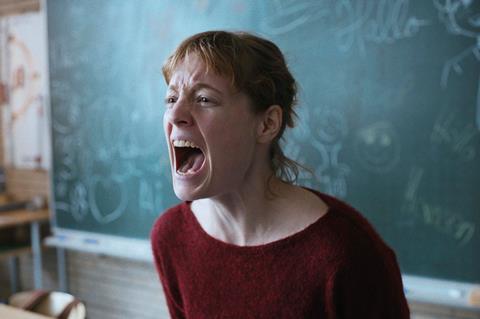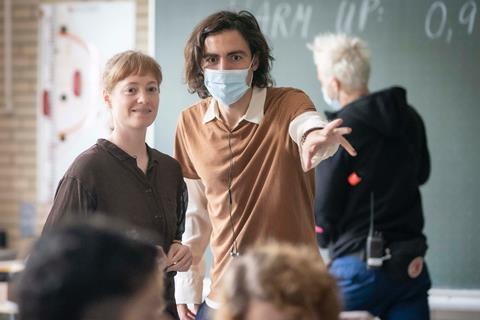Events spiral out of control in The Teachers’ Lounge after a German secondary school investigates a series of thefts. Screen talks to writer/director Ilker Catak about his thriller-like exploration of generational conflict, racism and scapegoating.

Born in Berlin to Turkish parents, Ilker Catak often mines his own family and experiences for inspiration when developing his films. A disagreement with his father during a word game prompted his well-received 2010 short When Namibia Was A City, in which he also cast his father. His award-winning second feature I Was, I Am, I Will Be — a five-time nominee at the 2020 German Film Awards — took things he saw while living in Turkey as a teenager and turned them into a drama about a male sex worker who marries a German tourist in the hope of a better life.
The story behind his fourth feature The Teachers’ Lounge, Germany’s entry for the best international feature Oscar, was sparked by an incident at the German high school in Istanbul that both he and the film’s co-writer, Johannes Duncker, attended.
Leonie Benesch stars as an eager young teacher whose well-intentioned investigation into a series of thefts at school finds her caught terrifyingly between colleagues, parents and students. Although framed and using many of the devices of the thriller genre — a prowling camera, a confined, maze-like single location and a nerve-jangling score that recalls Bernard Herrmann — the film’s themes of truth, censorship, trial by media, generational conflict, racism, scapegoating and moral dilemmas give it a rich relevance in our fake news- and social media-influenced world.
“We were aware of the genre elements like the whodunnit thing while we were writing, but for me that was just a tool to get a story about an idealistic teacher in a downward spiral,” says the director, whose Hamburg Media School graduation short, Fidelity (Sadakat), won the Student Academy Award for best foreign film in 2015. “The genre element came much later. Cinema is a very intuitive process, and at the beginning of the process I never know about most of the things that end up in the film. To me cinema is more of a search rather than making a product for a certain audience.”
The key was the decision to confine the story to one set: the school. “That made the film fly,” says Catak. “We realised that once you make a film about school, you’re also making a film about society because school is structured like society in terms of hierarchy, with power at the top, then the executive, then the press and the public. It was post-Trump and during the pandemic at a time of alternative facts and fake news, and we thought truth has become a matter of belief; you can’t just say this is the hard facts and I believe them.
“We were bugged by the fact that no-one listens to each other,” he continues. “And I was intrigued by cancel culture and how the people who carry it out think of themselves as modern and woke and on the right side of history. It reminded me of ancient times when people were put in the stocks in the village square. The grey areas of ambiguity are what interest me most.”
The team had a mood board featuring several different films as references, including the Dardenne brothers’ Young Ahmed for Catak’s student protagonist Oskar; Gus Van Sant’s Elephant for the visuals; Stéphane Brizé’s The Measure Of A Man and the Safdie brothers’ Uncut Gems for editing; and Yorgos Lanthimos’s The Favourite for music.
But principally, they did a lot of research to get the life within the school as accurate as possible. He and Duncker spent time in schools talking to educators, students, parents and psychologists. “The scene where two girls go to the admin office to ask for a tampon is not something that two dudes come up with,” he says. “That’s research.”
What they realised was that there has been a shift in who holds the reins since they were both at school. “When I went to school, my parents would say, if the teacher says so, it must be right,” explains Catak. “It’s the opposite now and power is with students and parents. The teachers also said parents want to unload all the work onto them, including authority, because the parents don’t want to be authoritarian. After having spent so much time in schools, my respect for teachers has grown so much.”
Under pressure

The filmmaker is not the only one who feels that way. At a screening with teachers and teenagers, one student thanked the filmmakers for showing her how much pressure teachers are under. “That [hit home] because that kind of mutual understanding is exactly what you want a film to accomplish,” says Catak.
The Teachers’ Lounge, which was produced by if… Productions and shot in an abandoned school in Hamburg in late 2021 with backing from broadcasters ZDF and arte, won five German Film Awards. They included best film, beating out Oscar winner All Quiet On The Western Front, and it has grossed more than $2m in German cinemas to mid-November. Sony Pictures Classics begins the US rollout on December 25, with Curzon releasing in the UK in March 2024.
The film was cast by the late Simone Bär and her partner Alexandra Montag. “Simone had the best ideas,” says Catak. “The teacher who objects to being accused of racism wasn’t originally seen as a person of colour, but she came up with the idea of casting Michael Klammer and I love her for that. It shows the absurdity of our times — the guy who knows exactly what it’s like to be in a victimised spot.”
Catak had admired Benesch since seeing her in Michael Haneke’s The White Ribbon. “We had images on a mood board while we were writing the script — everything from Mickey Mouse to people’s faces and film scenes — and her image was there from the beginning,” he says. “I think her time at London’s Guildhall School [of Music and Drama] was essential to the way she works — she doesn’t ask for backstory, she trusts the words. That’s a gift for me as director. Leonie’s intuition was always spot-on.” Benesch won best actress at the German Film Awards and is nominated for a European Film Award.
For the cast of children, Catak held a series of exercises to whittle down the candidates, followed by individual interviews to reach the final 23, all newcomers to the screen. “I explained how it was going to work, how they had to get up early, know their lines, that we were a team, and they were all equal. Every kid earned the same money, so it was basically communism on set. Leo Stettnisch, who plays Oskar [a young student whose school receptionist mother is accused of theft], is the son of Michael Klammer, who told me he wanted to be an extra. I rolled my eyes thinking, ‘Oh, another pushy parent,’ but when I met Leo, I thought, ‘How focused is this kid? Does he meditate five times a day?’”
The casting process also gave the director invaluable lessons in how to handle the young cast on set. “I brought in one girl’s mother during the final interview to give her opinion on something and the girl began to cry because she felt she didn’t have a say anymore and felt overwhelmed,” he says. “I realised that on the one hand you don’t want to treat them as kids, you want to treat them as colleagues, but you also had to be aware of their vulnerability. I had to find that balance during the shoot.”
Catak is now casting his next film Yellow Letters, which reteams him with if… Productions and German distributor Alamode. Co-produced by France’s Haut et Court and Turkey’s Liman Film and Tyger Film, it is about a Turkish couple who lose their jobs in the theatre for political reasons and must choose between selling out as artists or maintaining their integrity and living in poverty. It will film in Germany though is set in Turkey. “It’s an experiment,” says Catak. “I hope it will work out.”

























No comments yet